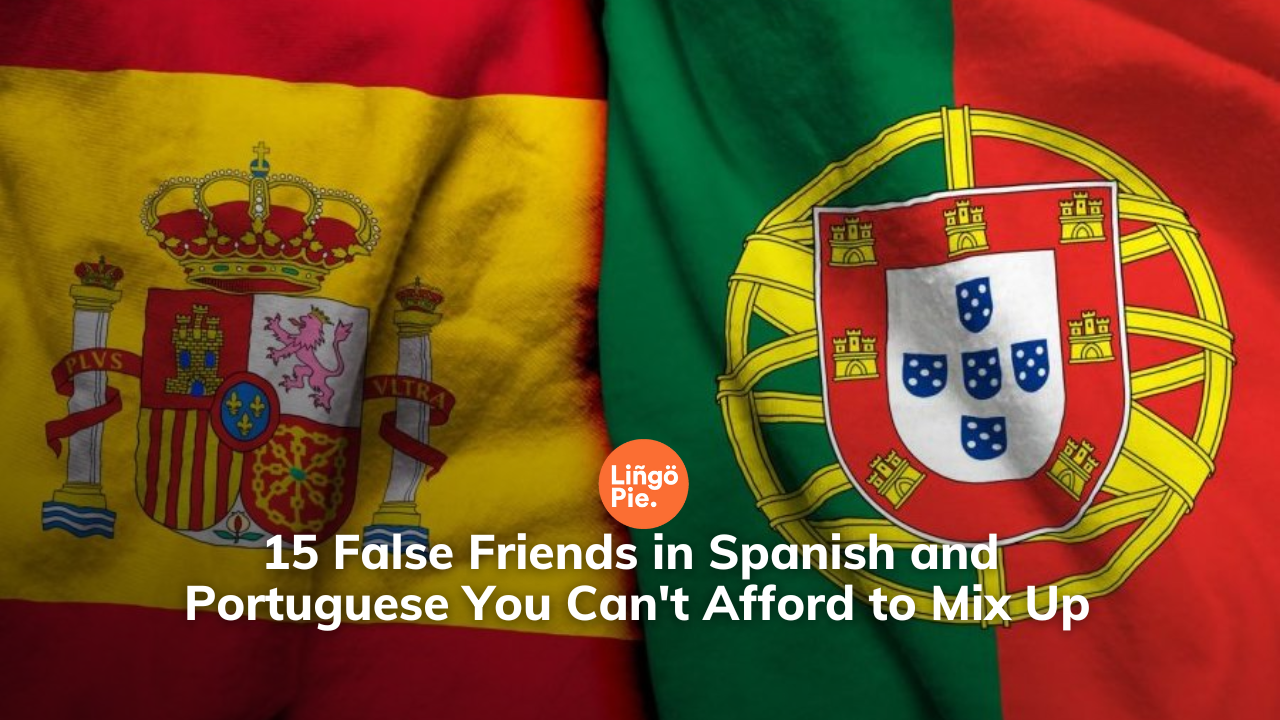Spanish and Portuguese are like twin siblings, given their common roots in the Romance language family. They have the same appearance. It’s hard to recognize who is Spanish, and who is Portuguese. There are many words in these two languages that can be misleading or cause confusion because they appear to have the same meaning, but actually have different meanings. These words are known as "false friends." It's time to identify the differences between them. ¡Let's take a look!

1. Borracha
In Spanish, "borracha" is an adjective meaning "drunk". We have "el borrado" which is a Spanish noun for a rubber or an eraser.
In Portuguese, "borracha" can mean "rubber" or "eraser". It is not used as an adjective to mean "drunk" as in Spanish. Instead, the Portuguese equivalent of "drunk" would be "bêbado" or "embriagado".
Examples:
● Spanish: Estoy borracha después de tomar demasiado tequila. I am drunk after having too much tequila.
● Portuguese: Preciso de uma borracha para apagar o lápis. I need a rubber to erase the pencil.
2. Brincar
This verb's meaning in Portuguese is "to play" or "to joke," whereas it means "to jump" in Spanish.
Examples:
● Spanish: Me gusta brincar en el trampolín. I like to jump on the trampoline ● Portuguese: Não estou brincando, estou falando sério. I'm not joking, I'm serious
3. Rato
In Portuguese, "rato" is a noun that signifies "a mouse," but in Spanish, "rato" translates "a while".
Examples:
● Spanish: Voy a esperar un rato más antes de irme. I'm going to wait a while longer before I leave
● Portuguese: O rato do meu computador está quebrado. My computer mouse is broken
Read also: Spanish vs. Portuguese: Which is easier to learn?
4. Salada
At first glance, it resembles the English word "salad". That's actually true, in Portuguese, Salada means "salad", while in Spanish it means "salty".
Examples:
● Spanish: La sopa está demasiado salada. The soup is too salty ● Portuguese: Esta salada de frutas está muito saborosa. This fruit salad is very tasty
5. Vaso
In Spanish, this word means "glass", whereas in Portuguese, it means "vase".
Examples:
● Spanish: Me puedes traer un vaso de agua, por favor?. Can you bring me a glass of water, please?
● Portuguese: Comprei um vaso de flores para decorar a sala. I bought a vase of flowers to decorate the room.
6. Oso/ Osso
Oso means "bear" in Spanish and "osso" means "bone" in Portuguese. In this case, Portuguese and French are very close; the term for bone in French is “os”.
Examples:
● Spanish: El oso panda es muy lindo. The panda bear is very cute. ● Portuguese: Me machuquei e agora sinto dor no osso do braço. I hurt myself, and now I feel pain in the bone of my arm.
7. Apellido/ Apelido
The Spanish word appellido, which is written with two letters L, signifies "last name." But there is only one letter, L, in Portuguese, and it stands for "nickname."
Examples:
● Spanish: Mi apellido es García. My last name is Garcia
● Portuguese: O meu apelido é Júnior. My nickname is Junior
8. Brinco
"Brinco" is the first-person singular (yo) conjugation of the verb "brincar" in Spanish. "Brincar" means "to play" or "to jump". In Portuguese, "brinco" means "earring", referring to a piece of jewelry.
Examples:
● Spanish: El caballo brinca la cerca. The horse jumps over the fence. ● Portuguese: Comprei um brinco de prata para combinar com o vestido. I bought a silver earring to match the dress.
9. Pegar
"pegar" is a verb in Spanish, which means “to stick”, while in Portuguese it means "to grap or to take".
Examples:
● Spanish: Necesito pegar esta pieza con pegamento. I need to glue this piece with glue.
● Portuguese: Eu vou pegar o ônibus para ir ao centro. I'm going to catch the bus to go downtown.
10. Mirar
The word "mirar" in Spanish can be understood as "to look" or "to watch", whereas in Portuguese, it conveys the meaning of "to aim" or "to target".
Examples:
● Spanish: Estoy mirando la película en el cine. I'm watching the movie at the cinema.
● Portuguese: O caçador mirou o alvo com precisão. The hunter aimed at the target with precision.
11. Propina
The word "propina" has a rather related meaning of money in Spanish and Portuguese. But In Spanish it means tip or bonus, while in Portuguese it means bribe.
Examples:
● Spanish: Si el servicio es bueno, siempre dejo una propina generosa. If the service is good, I always leave a generous tip.
● Portuguese: Não aceito pagar propina para conseguir um emprego. I don't accept paying a bribe to get a job.
Read also: Are we the same person in different languages?
12. Oficina
In Spanish, it denotes a space for manual labor, such as a workshop or garage. In contrast, in Portuguese, "oficina" typically indicates a place for administrative or professional work, such as an office or department.
Examples:
● Spanish: El mecánico trabaja en una oficina mecánica reparando coches. The mechanic works in a car repair workshop.
● Portuguese: O escritório fica na última sala da oficina. The office is located in the last room of the bureau.
13. Embarazada/Embaraçada
This is a classic example of a false friend between Spanish and Portuguese. There have been many people using this word to cause laughter with many people, if you are mistaken with it. In Spanish, "embarazada" means pregnant, while in Portuguese, "embaraçada" means embarrassed.
Examples:
● Spanish: Mi esposa está embarazada de gemelos. My wife is pregnant with twins.
● Portuguese: Fiquei embaraçada quando tropecei e caí na frente de todos. I was embarrassed when I tripped and fell in front of everyone.
14. Largo/a
It's an adjective. In Spanish, "largo/a" means long, while in Portuguese, it means “wide”.
Examples:
● Spanish: Necesito un cordón más largo para mis zapatos nuevos. I need a longer shoelace for my new shoes.
● Portuguese: A rua é muito larga para atravessar a pé. The street is too wide to cross on foot.
15. Acordar
In Spanish, "acordar" means to agree or to make a deal, while in Portuguese, it means to wake up. We have another reflexive verbe “acordarse” in Spanish, but it means “to remember”.
Examples:
● Spanish: Llegamos a un acuerdo sobre el precio de la casa. We reached an agreement on the price of the house.
● Portuguese: Acordei cedo hoje para ir à academia. I woke up early today to go to the gym.
As you can see, false friends between Spanish and Portuguese can be tricky and confusing, but by understanding their different meanings, we can avoid miscommunication and enhance our communication.

At Lingopie, we believe in giving learners the tools they need to become proficient in their target language. Our innovative language learning platform offers a wide range of resources, including live TV shows and movies, interactive lessons, and personalized feedback from expert instructors. With Lingopie, you can learn Spanish or Portuguese (and many more!) in a fun, engaging way, while avoiding common pitfalls like making fake friends. Don't let fake friends get in the way of your language learning journey. Sign up for Lingopie today and start to speak Spanish or Portuguese with confidence!






![30+ Modern English Slang Terms For Money [Guide]](/blog/content/images/size/w300/2025/06/Slang-term-for-money.jpg)
![5 Official Spanish Language Tests To Show Your Proficiency Level [Guide]](/blog/content/images/size/w300/2025/06/Spanish-Language-Tests.jpg)

![Why Memorizing Spanish Words Won’t Make You Fluent [Tips]](/blog/content/images/size/w300/2025/06/how-to-practice-spanish-vocabulary.jpg)